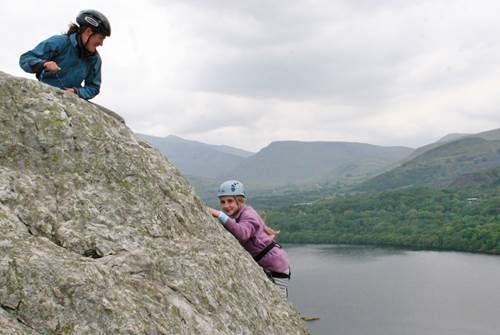How to be a better leader – phone a friend
If you want to develop your professional practice and be a better leader, it’s important to engage with others. Why? Because your experience will only help you improve if you are able to learn something from it and other people can help you with that learning process.

At Mountain Training we have always advised candidates to make the most of their preparation for training and consolidation period and attend a training or assessment course with the appropriate amount of experience. To help with this we have agreed a list of prerequisites for each qualification which must be completed with regards to quality mountain days, routes of a certain grade and/or experience of assisting with the supervision of groups. We expect candidates to develop as leaders while fulfilling these requirements. So when a candidate attends an assessment with an acceptable amount of experience (often in excess of the minimum) and is not successful, is it because they haven’t done enough?
The
research into preparation for the Mountaineering Instructor Award carried out recently found that in fact the volume of practice carried out by trainees did not have an impact on their assessment result. Simply doing more didn’t necessarily mean that they did any better.
What matters is the quality of the experience and this boils down to what you have learned from each session. So how can you make sure you’re having a quality experience that is full of learning?
The unknown
As you spend more time walking or climbing, you’ll soon come to recognise the quality days/routes from those that are decidedly average. You learn the most when you venture into the unknown, whether that’s new mountains, different weather, a different group, a new style of route or a new grade; you have to adapt what you’re doing. Something was different and you had to take action. If it doesn’t all go to plan, or even if it does, you need some kind of feedback loop in place to help you work out why, so that you can either do the same thing again or do something different next time.
You can work through this feedback loop by yourself, but bear in mind that you have blind spots that other people can help you uncover. When someone else asks you questions about your experience, they will often be ones that you haven’t asked yourself which gives you an opportunity to learn more from what happened.
The company you keep
These ‘other people’ that will help you develop your practice as a leader can take various shapes and forms. You may already have one or more groups of people that you can ask for advice and where you provide support to others. They may be formal or informal networks and include friends, work colleagues or mentors. They are often referred to as a community of practice. If you don’t have access to this sort of knowledge network or community of practice, the
Mountain Training Association is well-placed to help you create one.
As well as hosting weekend conferences and workshops, the Mountain Training Association has 11
regional groups that enable members to get together locally to undertake peer led training, share good practice and socialise with other outdoor trainees and leaders. They are an ideal place to connect, share information and learn from each other. You can then continue to meet face to face as a group or communicate in other ways as you interact more regularly.
 A few words of caution
A few words of caution: try to make sure your network/community is made up of people with varied experience levels. If it is full of people that are at the same point in their development or have the same perspective, it’s possible to end up confirming between you all that you’re doing the right thing when in fact there might be a better way. Less experienced people can ask a “silly question” which might make you think differently about what you did and more experienced people can offer some advice or guidance based on their own practice.
Find out more about the
Mountain Training Association or
join now for just £39.
If you are working in isolation, reflect in company.